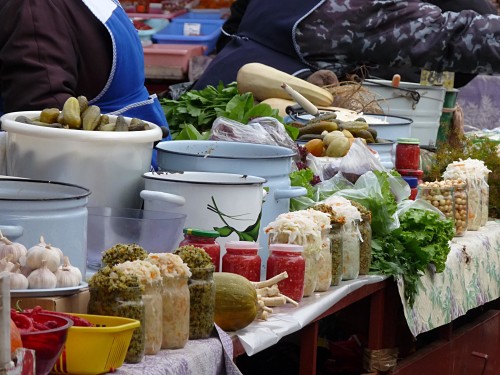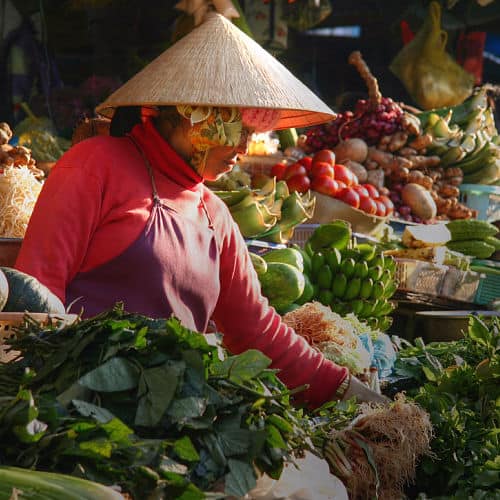Patterns of food provision and consumption have become objects of increasing concern among both scholars and activists. In the last few decades, the ways in which food is both produced and processed, networks of retail and distribution, as well as labour conditions in which these processes take place have been at the centre of a debate generally advocating “alternative” and “ethical” food models. The analysis of these movements has so far overwhelmingly focused on the forms and claims that “alternative food networks” have taken in Western advanced capitalist countries.

The present volume, edited by anthropologists Melissa Caldwell, Yuson Jung, and Jakob A. Klein, and published in 2014 by University of California Press, provides very much needed insights of meanings and dynamics of “ethical eating” in postsocialist and market socialist societies.
The discussion brought about in eight chapters focusing on Lithuania, China, Russia, Cuba, Bulgaria, and Vietnam focuses on issues such as food safety and moral economies in the framework of Europeanisation politics (ch. 1); the moral significance of food (ch. 2); alternative food networks and farmers’ markets (ch. 3); certification and organic food (ch. 4); the connection between rural producers and urban consumers (ch. 5); the politics and ethics of vegetarianism (ch. 6); agroecology and sustainability (ch. 7); and food practices as civic engagement for building a “healthy” nation (ch. 8). In addition to providing a general account of the main points raised in the book, in this review I will pay specific attention to chapters dealing with post-Soviet countries – chapters 1 and 3 on Lithuania and chapter 8 on Russia – as part of my current research area. My study on Georgian hospitality, focusing on the pivotal role of food and drink in host-guest relations, has certainly gained fresh insight from the debate initiated by the book’s contributors.
The detour from mainstream Western-focused accounts of “alternative food movements” to the postsocialist world is not meant only to point out differences between the latter and its Western European and North American “counterparts”. Rather, the book investigates “the diversity of postsocialisms, capitalisms, and neoliberalisms that underlie these movements” (p. 12), in order to highlight the ways in which understandings of what is “ethic” – in this case in relation to food – are embedded in specific historical, socio-cultural, political, and economic contexts. In the introduction, it is convincingly argued that, rather than by conceiving food as something ethical or unethical per se, these “alternative” ideas may be more interestingly investigated by questioning “how foods, and by extension personal food practices such as eating and sharing, come to be ethical or unethical” (p. 6), and how they are constructed and perceived as such. In this framework, notions of both “ethical” and “alternative” become contingent on the specifics from which they stem, at an individual, local, and national level.
“Alternative food movements” – and the ideas underpinning them – analysed through rich ethnographic details in the chapters cannot be understood as separated from experiences and memories of state socialism, which, to varying extents, continue to inform these societies’ present.
Renata Blumberg’s chapter on alternative food networks and farmers’ markets in Vilnius shows how attitudes towards entrepreneurship inherited from socialism are linked to consumers’ ongoing mistrust for market vendors nowadays. In Melissa Caldwell’s chapter, contemporary Russians’ positive feelings towards gardening are partly related to perceptions of gardens as intimate places in opposition to the lack of privacy entailed by the Soviet housing system.
While in Lithuania collective memories of Soviet times are largely negative, with a general commitment towards the European Union and a widely shared acceptance of the free market as the main economic models, communist legacies in Russia are met with more ambiguous attitudes. Referring to Cynthia Gabriel’s work, Caldwell reports how several Russian people still define some industrially produced food in pejorative terms as “capitalist food”, predominantly because it is not Russian.

Past legacies informing people’s perception and dispositions towards food practices also refer to what socialism officially was not.
More specifically, informal networks of friends and acquaintances, which were crucial for gaining access to goods and services in perennial shortage due to Soviet institutions’ inefficiencies, still seem to be pervasive of post-Soviet citizens’ food practices. In her chapter “Raw Milk, Risk Politics, and Moral Economies in Europeanising Lithuania”, Diana Mincyte points out that the introduction of new technologies complying with European regulations on the food sector – namely raw milk vending machines located in Lithuanian supermarkets – besides tackling food risk issues, somehow puts an end to informal economic networks which “have defined postsocialist Lithuania’s dairy sector for almost two decades” (p. 25). Caldwell explains that the superior value bestowed by Russians upon ekologicheski chistoe, or “ecologically clean” food – that is, “a model of ethical consumption that draws on Russian values of a bionational citizenship that links together citizens’ bodies, civic goals, and a nationalised nature” (p. 189) – is linked to a sense of sociability and intimacy occurring when items circulate through informal networks, as opposed to food produced and distributed in anonymous and standardised ways.
Another prominent feature of “ethical eating” in postsocialist societies is the relation between “alternative food movements” and the state. Unlike in Western capitalist countries, where such movements are explicitly understood – yet in often contradictory terms – in opposition to “a dominant, capitalist agrifood system” (p. 10), in the postsocialist space the state itself has an active role in “ethical deliberations” (p. 10). Still, such roles clearly change from one country to another. In Russia, since the Soviet times, the state has vigorously promoted a lifestyle – in which diet has a prominent place – concerned “with the overall health and wellness not just of Russian citizens but of Russian society more generally” (p. 194). Such concerns have been translated not into a rejection of industrial food and genetically modified products, as for several “Western” food movements, but into resistance to food non indigenous to Russia at large.
As for Lithuania, Blumberg points out that institutional interventions, dating back to the energetic politics of decollectivisation in the 1990s, led to “an agricultural sector dominated by a large number of small-scale subsistence-oriented family farms that possessed few assets, received little state support, and could not compete with the imports entering the market through the liberalisation of trade” (p. 74). The 2004 EU integration, which introduced increasingly vertical regulations of food chains, further marginalised small-scale producers. Vilnius farmers’ markets emerged in a context in which “categories such as “local” and “natural” gained new meanings and heightened importance” (p. 76). However, these “alternative food networks” are successful inasmuch as “they create places for well-established production and consumption trajectories” (p. 84). Cultural and social practices related to different times and space – such as the Soviet era, or city (non-farmer) markets – forge these new venues and the ways they are perceived by consumers in a tension between approval and scepticism. In Mincyte’s case of raw milk, state interventions along with the European Union’s strict regulations of both the quality and quantity of produced and distributed food cast light on “disputed claims to authenticity, safety, and value” (p. 26). On the one hand, national institutions and European bureaucracies support regulated and standardised procedures of food production and consumption as a way of protecting the general public through the provision of safer food in a more hygienic environment. On the other hand, people resorting to informal raw milk networks equally stress their commitment to provide healthy and affordable food to their families through creative strategies and exchanges with trusted counterparts, perceived as more reliable than the industrial food sector.
Myncite’s point on such competitive ethics brings us back to the embeddedness of what is perceived, defined, and enacted as “ethical” into specific contexts. In my opinion, the greatest merit of this book is to put forward, through this idea of embedded ethics and the specific cases of postsocialist societies, a critical rethinking of state-market-citizen relations (p. 13).
The focus on “food movements” provided by Ethical Eating in the Postsocialist and Socialist World, while bringing about “alternative” models of these relations, at the same time questions the actual or (rather) fictitious separation and contrast between national and international political and economic institutions on the one hand, and these movements in Western capitalist countries on the other.
A “universalising language of ethics” (p. 41), which assigns fixed roles and places to state, market, and citizens in their mutual relations, would obscure understandings and dynamics of food movements in so much as the latter are detached from their historical and geopolitical structures. This book is a valuable source of insight both for scholars and activists looking for more nuanced and “culturally sensitive” approaches to food and its social, political, symbolical, and practical meanings.
This post marks the third part of our special review section on Ethical Eating in the Postsocialist and Socialist World. If you liked it, you should also read the first part here and the second part here.
Caldwell, Melissa L., Klein, Jakob A. and Jung, Yuson (eds.). 2014. Ethical Eating in the Postsocialist and Socialist World. Oakland: University of California Press. 232 pp. Hb: $65.00. ISBN: 9780520277403



